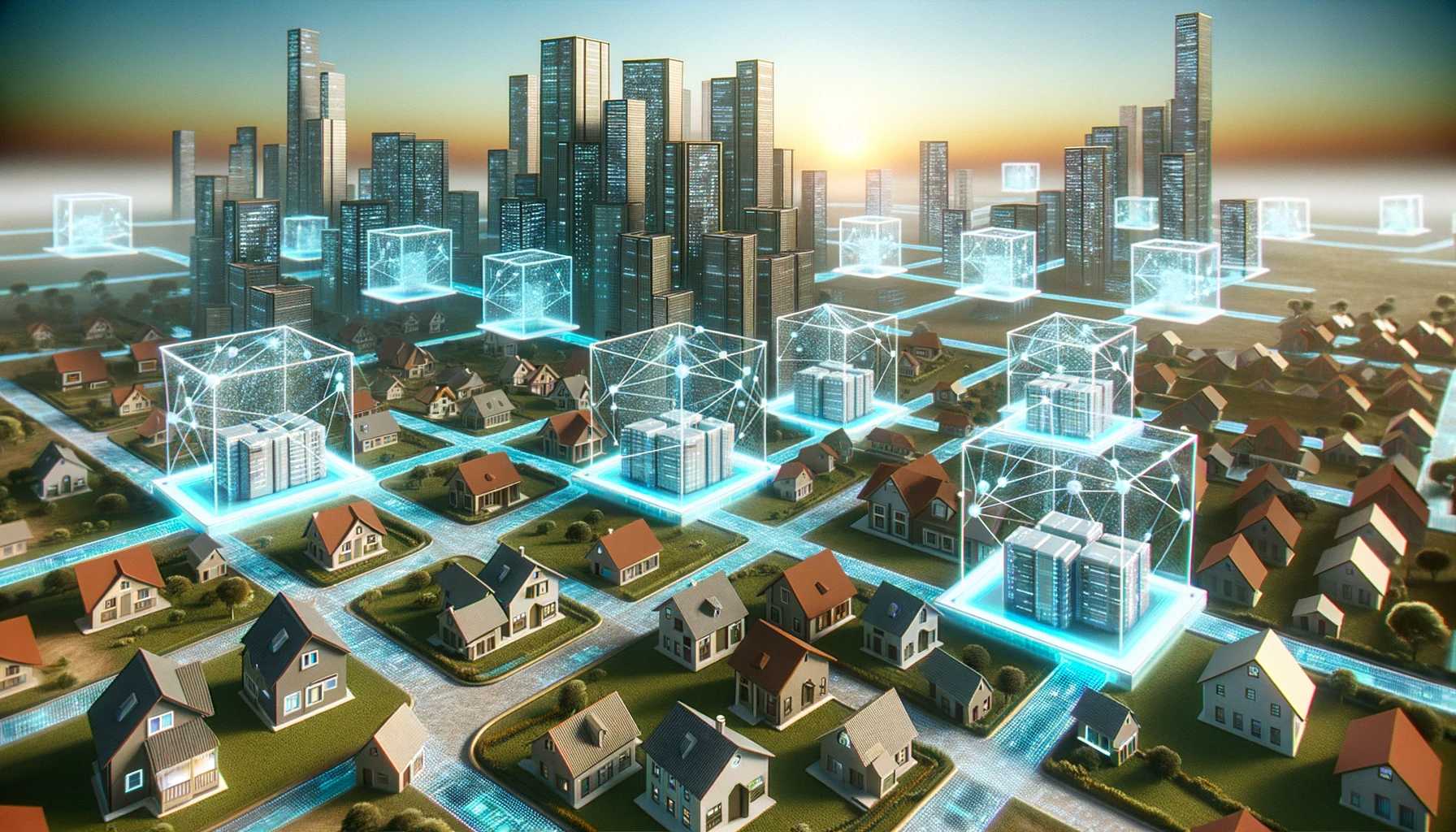Blockchain and Real Estate are two terms that might seem unrelated at first.
However, when they come together as Blockchain in Real Estate, they hold the power to reshape the traditional real estate world we are familiar with.
The blockchain, a technology that came into the limelight with cryptocurrencies like Bitcoin, has far-reaching implications. Its ability to ensure transparency, security, and immutable record-keeping is now finding its ground in real estate, a sector known for its paperwork and often tedious processes.
As we dive deeper into this article, you’ll uncover how blockchain is revolutionizing the way we deal with properties – from buying a new home to investing in commercial real estate.
The future holds a blend of digital advancements with brick and mortar, making transactions smoother, quicker, and more trustworthy.
Key Takeaways
Key Point Explanation Transparency Blockchain provides a transparent and immutable ledger, ensuring trust in transactions. Cost Efficiency Reduced costs in transactions and management through blockchain. Automation Smart contracts automate various processes, making transactions smoother. Tokenization Enables fractional ownership, allowing more people to invest in real estate. Future Trends Blockchain is poised to revolutionize real estate transactions, with several companies already pioneering this integration.
This introductory glimpse has just scratched the surface.
Stay with us to explore the depth of blockchain’s impact on the real estate sector, and how it’s not just a boon for tech-savvy investors but for anyone looking to dabble in the property market.
Blockchain Transforming Real Estate Transactions
The fusion of Blockchain and Real Estate is like a breath of fresh air in a sector that has been traditionally bogged down by manual processes, paperwork, and intermediary overload.
Let’s explore how this blend is morphing the real estate terrain:
Automating Transactions
Blockchain brings in a level of automation that speeds up transactions while reducing errors significantly.
Here’s how:
- Smart Contracts: These self-executing contracts with the terms directly written into code automate transactions without the need for intermediaries, making processes like buying, selling, or leasing properties faster and cheaper.
- Tokenization: By converting real estate assets into tokens on a blockchain, properties can be bought and sold in fractions, opening doors for many to invest with lower capital.
- Property Management: Blockchain facilitates better property management through a transparent ledger system where all transactions related to a property are recorded and easily accessible.
Enhancing Transparency and Security
One of the key benefits of blockchain is its ability to foster transparency and enhance security:
- Immutable Ledger: Every transaction once recorded on the blockchain cannot be altered, ensuring trust and transparency.
- Verification and Validation: Blockchain allows for quick and secure verification of property details, reducing the chances of fraud.
- Secure Transactions: With blockchain, the transactions are secure and the chances of fraud are considerably minimized.
Reducing Costs
Blockchain minimizes the dependency on various intermediaries typically involved in real estate transactions, thus reducing the costs:
- Lesser Intermediaries: The need for various intermediaries like brokers, lawyers, and banks are reduced, thus lowering transaction costs.
- Efficient Processes: Processes become more streamlined and efficient, saving time and money.
Blockchain is not merely a technology; it’s an upgrade to the real estate sector.
This section merely touches on the surface of blockchain’s potential in real estate.
For a deeper dive into blockchain’s universe, check out this comprehensive guide on Blockchain and Cryptocurrency.
This transformation is not a vision of the distant future but a reality that’s reshaping the real estate sector now.
The following sections will unravel more about the companies spearheading this transformation and the benefits awaiting the commercial real estate sector.
Companies Pioneering Blockchain in Real Estate
The integration of blockchain technology in the real estate sector is a game-changer, and several companies are leading this digital revolution.
Here are four platforms that are at the forefront of this innovative crossover:

Propy
- Mission: Propy aims to simplify the real estate transaction process by providing an automated platform where buyers, sellers, and their agents can close deals entirely online. By uploading purchase offers, payments, and deeds to an immutable blockchain, Propy ensures transparency and security in transactions.
- Innovations: Propy’s platform allows for seamless transactions, eliminating the need for multiple systems and minimizing the chances of errors. Additionally, Propy has laid the groundwork for real estate NFT transactions, marking a significant step towards the future of real estate transactions.

RealT
- Mission: RealT’s goal is to democratize real estate investment by offering a platform for simplified, fractional investments in real estate properties. Through tokenization, RealT allows for the buying and selling of fractional interests in real estate properties, making investment more accessible.
- Innovations: RealT’s platform is unique as it links the deed of the property to the blockchain, making it immutable. This innovation not only ensures the security of the ownership but also provides an avenue for selling properties as NFTs, thus speeding up the conveyance process.

Vairt
- Mission: Vairt aims to provide a platform for earning secondary income through a diversified global real estate network. By leveraging blockchain technology, Vairt offers various resources and tools to its users, thus making real estate investment a more streamlined process.
- Innovations: By creating a blockchain network for global real estate, Vairt is opening up new avenues for investments, thus creating a more inclusive real estate market.

RealBlocks
- Mission: RealBlocks strives to provide a platform for buying fractional interests in real estate, aiming to reduce fees, speed up processes, and provide liquidity options through blockchain technology.
- Innovations: The platform leverages blockchain to offer a new way of real estate investment, allowing more people to invest in real estate by buying fractional interests.
These four companies are not just leveraging blockchain for the sake of technology but are utilizing its potential to solve real-world problems in the real estate sector.
Their innovative approaches are laying the foundation for a more transparent, accessible, and efficient real estate market.
As we explore further, we’ll uncover more about the various benefits and real-world applications of blockchain in real estate.
Benefits of Blockchain in Real Estate
The amalgamation of blockchain technology and real estate is perceived as a milestone towards a more transparent and efficient property market.
Below are some notable benefits:
Transparency and Trust
- Immutable Ledger: Blockchain provides a transparent and immutable ledger where transactions are recorded and verified publicly. This feature eliminates the chances of fraud and promotes trust among parties involved in a transaction.
- Verification and Validation: Property details, ownership records, and transaction histories can be verified quickly and securely on a blockchain, ensuring validation and reducing the chances of disputes.
Cost and Time Efficiency
- Reduced Intermediaries: By automating various processes and reducing the need for multiple intermediaries like brokers, lawyers, and banks, blockchain significantly lowers the transaction costs in real estate dealings.
- Streamlined Processes: Blockchain streamlines real estate processes, making transactions faster and more efficient, thereby saving both time and money.
Automation
- Smart Contracts: Smart Contracts facilitate automated transactions that are executed when predetermined conditions are met, thus making real estate transactions smoother and more efficient.
- Automated Record-Keeping: Blockchain automates record-keeping, thus ensuring accuracy and reducing the administrative burden.
Tokenization
- Fractional Ownership: Blockchain enables the tokenization of real estate assets, allowing for fractional ownership. This feature opens up real estate investment to a broader audience by lowering the entry barriers.
- Easier Asset Management: Tokenization also makes managing and transferring real estate assets easier and more efficient.
Blockchain not only presents a myriad of benefits but also the promise of revamping the real estate sector into a more accessible and trustworthy market.
For those looking to delve deeper into this technology, this comprehensive guide on Blockchain and Cryptocurrency is an excellent resource.
As we venture into the subsequent sections, we’ll explore how blockchain is making a remarkable impact in commercial real estate, bringing to light real-world applications and case studies that exemplify the potential of blockchain in real estate.
Real-world Applications of Blockchain in Real Estate
Blockchain’s versatility lends itself to various practical applications in the real estate sector. Here are some of the real-world applications that are reshaping the landscape of real estate transactions and management:
Smart Contracts
- Automated Transactions: Smart contracts facilitate the automation of real estate transactions, making processes like buying, selling, or leasing properties faster and cheaper. They execute transactions automatically once the predetermined conditions are met, reducing the need for intermediaries and lowering transaction costs.
- Lease Agreements: Smart contracts can also be employed to automate lease agreements, ensuring that terms are met and automating payments, thus making the leasing process more efficient and transparent.
Tokenization
- Fractional Ownership and Investment: By converting real estate assets into tokens on a blockchain, properties can be bought and sold in fractions, opening doors for many to invest with lower capital. This decentralizes real estate investment and allows for more inclusive participation.
- Asset Management: Tokenization simplifies asset management by making the transfer of tokens (representing real estate assets) easier and more efficient, thus facilitating a smoother transaction process.
Title and Property Records
- Immutable Records: Blockchain allows for immutable recording of title and property records, ensuring that these crucial documents are secure, transparent, and unalterable.
- Quick Verification: The ability to quickly verify property details and ownership records on a blockchain reduces the time and resources required in property verification processes, thus speeding up transactions.
Marketplaces for Tokenized Real Estate
- Transparent Pricing: Blockchain facilitates the creation of marketplaces for tokenized real estate, where pricing is transparent and transactions are secure.
- Global Access: These marketplaces provide a platform for global investors to access real estate investment opportunities, regardless of geographical boundaries.
Blockchain’s applications in real estate extend beyond just transactions; they herald a new era of transparency, efficiency, and global participation. Its potential to resolve longstanding issues in real estate is substantial, making it a catalyst for a paradigm shift in this sector.
The subsequent sections will delve deeper into the impact of blockchain on commercial real estate, providing a thorough exploration of how this technology is not merely a temporary trend but a cornerstone for future real estate transactions and management.
Impact on Commercial Real Estate
Blockchain’s transformative potential extends remarkably to the commercial real estate (CRE) sector.
The technology is poised to solve several longstanding challenges in CRE, paving the way for more streamlined, transparent, and efficient operations.
Here’s a look at the profound impact blockchain is making in the commercial real estate arena:
Transaction Efficiency and Security
- Automated Transactions: The automation of transactions through smart contracts expedites the processes of buying, selling, or leasing commercial properties, thus reducing the time and costs involved.
- Immutable Record-Keeping: Blockchain’s immutable ledger technology ensures that all transactions are securely recorded and cannot be altered, providing a solid foundation of trust and transparency in commercial transactions.
Asset Tokenization
- Fractional Ownership: Tokenization enables fractional ownership of commercial properties, lowering the entry barriers for investors and allowing a broader spectrum of individuals and entities to participate in commercial real estate investments.
- Liquid Real Estate Market: By facilitating easier transfer and management of real estate assets, blockchain contributes to a more liquid real estate market, where assets can be traded more freely and efficiently.
Transparent Lease Management
- Automated Lease Agreements: Smart contracts can automate lease agreements in commercial properties, ensuring adherence to terms and timely payments, thus simplifying lease management and enhancing the leasing experience for both landlords and tenants.
- Real-time Lease Monitoring: Blockchain enables real-time monitoring of lease agreements, providing a transparent platform for all parties involved to track and verify lease terms and payments.
Enhanced Due Diligence
- Quick Verification: The ability to quickly and securely verify property details, ownership records, and transaction histories on a blockchain significantly streamlines the due diligence process in commercial real estate transactions.
- Improved Data Accuracy: With blockchain, data recorded is immutable and transparent, which significantly improves data accuracy and reliability, thus aiding in better decision-making for investors and stakeholders.
Blockchain’s entrance into the commercial real estate sector is a monumental stride towards a more transparent, efficient, and inclusive market.
The technology’s ability to streamline transactions, facilitate fractional ownership, and ensure robust security is truly game-changing.
As we move forward, we’ll explore more case studies that exemplify the transformative power of blockchain in the real estate sector, substantiating how blockchain is not merely a disruptive force but a foundational technology for the future of commercial real estate.
Case Studies: Blockchain in Action in Real Estate
The implementation of blockchain technology in real estate isn’t merely theoretical; various projects and collaborations are demonstrative of its practical utility. Below are some case studies that illustrate how blockchain is being applied in real estate to solve real-world problems:
Tokenization of Real Estate Assets
- Aspen Coin: The St. Regis Aspen Resort in Colorado tokenized 19% of its real estate on a blockchain, raising $18 million. This case exemplified how tokenization could unlock liquidity in real estate and provide investors with a new, more flexible way to invest in property assets.
- RealT: RealT’s platform has facilitated the tokenization of various properties, allowing investors to buy and sell fractional ownership in real estate, thus democratizing real estate investment.
Blockchain for Title Records
- Sweden’s Land Registry: In collaboration with blockchain companies, Sweden’s Land Registry explored the use of blockchain for recording property titles and facilitating real estate transactions, aiming to streamline processes and ensure greater security and transparency.
- Cook County Pilot Program: In the US, Cook County’s pilot program explored the use of blockchain for title transfer and fraud prevention, demonstrating blockchain’s potential to provide a secure and immutable record of property titles.
Blockchain in Lease Management
- Smart Contracts for Lease Agreements: Various projects have emerged that utilize smart contracts for automating lease agreements, ensuring adherence to terms, and simplifying lease management.
- Real-time Monitoring: Blockchain platforms are being developed to provide real-time monitoring of lease agreements, making lease management more transparent and efficient for all parties involved.
Blockchain-based Real Estate Platforms
- Propy: Propy’s platform facilitates online real estate transactions, automating the buying and selling process through blockchain to ensure security, transparency, and efficiency.
- Vairt: Offering a blockchain-based platform for building a global real estate network, Vairt is enabling users to invest in real estate and earn secondary income.
These case studies underline the transformative potential of blockchain in real estate, showcasing how the technology is being utilized to solve longstanding challenges in the sector.
The practical applications of blockchain in real estate are vast, and as the technology continues to mature, its adoption is expected to grow, heralding a new era of transparency, efficiency, and inclusivity in real estate transactions and management.
As we wrap up, we’ll summarize the key takeaways from this exploration, encapsulating how blockchain is set to revolutionize the real estate sector.
Conclusion: The Future of Real Estate is Blockchain
Blockchain technology is poised to rewrite the rulebook in the real estate sector.
Through its myriad applications, blockchain is solving longstanding challenges, paving the way for a more transparent, efficient, and inclusive real estate market. Here are the key takeaways from our exploration:
Revolutionizing Transactions
- Automation: Blockchain automates the transaction process, making buying, selling, and leasing properties faster, more efficient, and less prone to errors.
- Transparency: By providing a transparent and immutable ledger for recording transactions, blockchain cultivates trust among parties involved in a transaction.
Unlocking New Investment Opportunities
- Fractional Ownership: Tokenization on a blockchain enables fractional ownership, lowering the entry barriers for real estate investment and opening up the market to a broader spectrum of investors.
- Global Marketplaces: Blockchain facilitates the creation of global marketplaces for real estate, transcending geographical boundaries and creating a truly global real estate market.
Enhancing Security and Reducing Fraud
- Immutable Records: The immutability of blockchain ensures that records once entered cannot be altered, significantly reducing the potential for fraud in property transactions and title transfers.
- Secure Transactions: Smart contracts and blockchain’s transparent nature ensure secure transactions, reducing the risk of fraud and disputes.
Pioneering Companies Leading the Charge
- Innovative Platforms: Companies like Propy, RealT, Vairt, and RealBlocks are pioneering blockchain applications in real estate, showcasing the practical utility and transformative potential of blockchain in this sector.
The fusion of blockchain and real estate is not just a fleeting trend but a substantial shift that’s set to redefine the real estate landscape.
The practical examples and case studies discussed underline blockchain’s potential to be a cornerstone technology in the future of real estate.
The journey of blockchain in real estate is just beginning, and its full potential is yet to be realized.
However, the initial implementations and the growing interest among stakeholders are strong indicators of blockchain’s promising future in revolutionizing real estate.
Frequently Asked Questions
| Questions | Answers |
| How does blockchain improve real estate transactions? | Blockchain improves real estate transactions by automating processes through smart contracts, ensuring transparency with an immutable ledger, and facilitating fractional ownership via tokenization. |
| What are smart contracts and how are they used in real estate? | Smart contracts are self-executing contracts where the terms are directly written into code. In real estate, they can automate transactions, lease agreements, and ensure adherence to contract terms automatically. |
| How does fractional ownership work in blockchain real estate? | Fractional ownership in blockchain real estate involves tokenizing a property into smaller, tradable shares, allowing multiple investors to own and trade fractions of the property. |
| How are companies like Propy, RealT, Vairt, and RealBlocks utilizing blockchain in real estate? | These companies are utilizing blockchain to facilitate online real estate transactions, tokenize properties, automate lease agreements, and create global real estate marketplaces, thus solving real-world problems in the real estate sector. |
| What is the impact of blockchain on commercial real estate? | Blockchain impacts commercial real estate by streamlining transactions, enhancing security, facilitating fractional ownership, and improving lease management among other benefits. |
| Are there real-world examples of blockchain applications in real estate? | Yes, examples include the tokenization of the St. Regis Aspen Resort by Aspen Coin, Sweden’s Land Registry exploring blockchain for title records, and platforms like Propy and RealT facilitating blockchain-based real estate transactions. |
| How does blockchain ensure secure transactions in real estate? | Blockchain ensures secure transactions by recording all transactions on an immutable ledger, and utilizing smart contracts to automate and verify transaction processes. |
| How can blockchain make real estate investment more accessible? | By enabling fractional ownership and creating global marketplaces, blockchain lowers the entry barriers for real estate investment, making it more accessible to a broader audience. |
| What are the challenges of integrating blockchain in real estate? | Challenges include regulatory hurdles, technological complexity, and the need for widespread adoption and understanding among stakeholders in the real estate sector. |
| How can I learn more about blockchain and its applications in real estate? | For a deeper understanding, you can read this comprehensive guide on Blockchain and Cryptocurrency, and stay updated with the latest trends and projects in blockchain real estate.【30†source】 |
These FAQs provide a quick insight into the vital aspects of blockchain in real estate. The innovative convergence of blockchain technology and real estate is a burgeoning field with a promising future, poised to simplify real estate transactions and open new avenues for investment and management.




